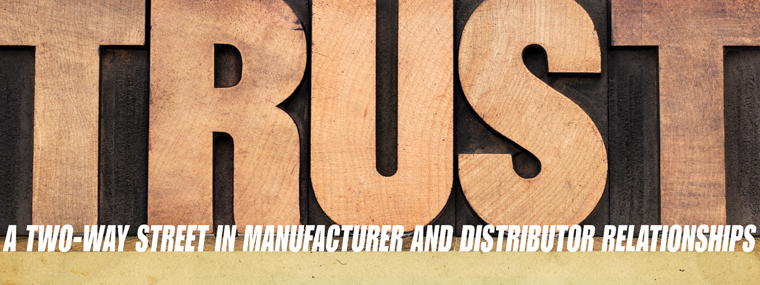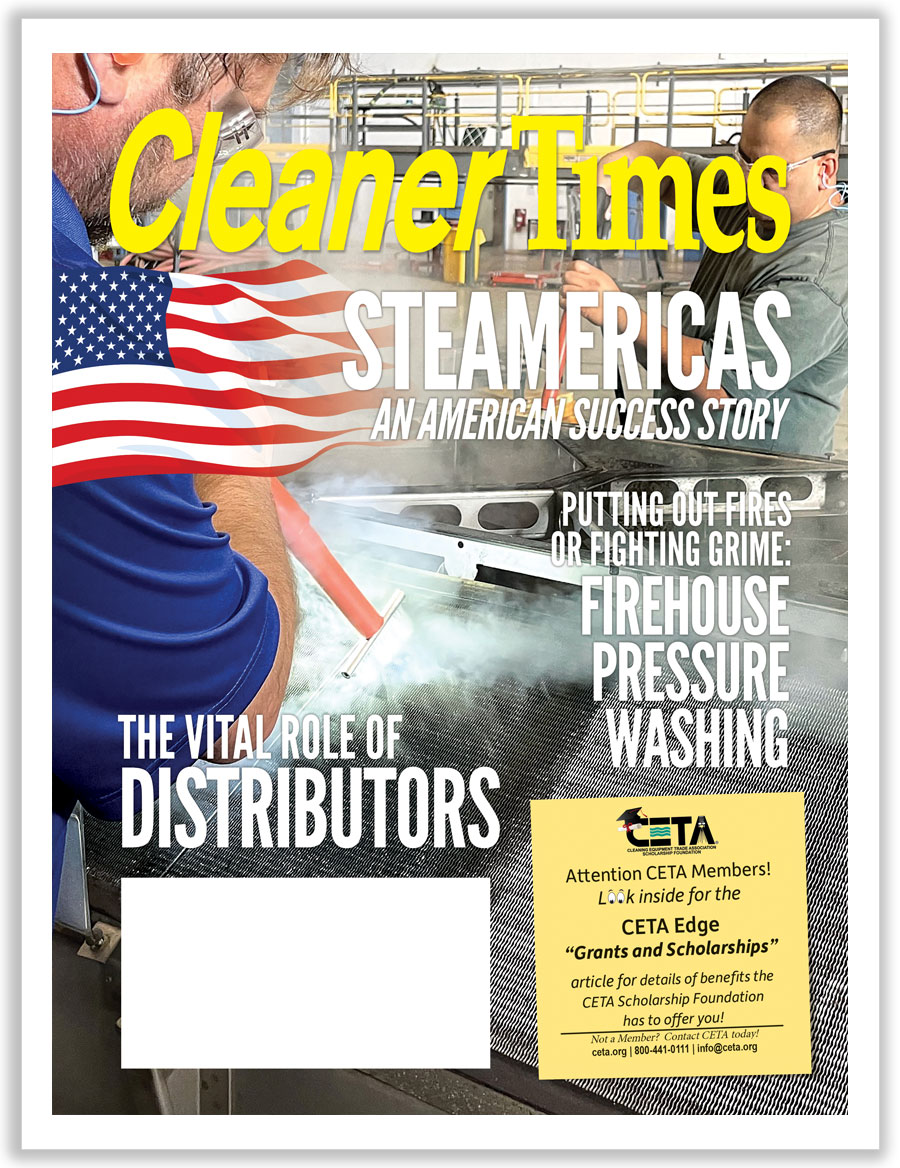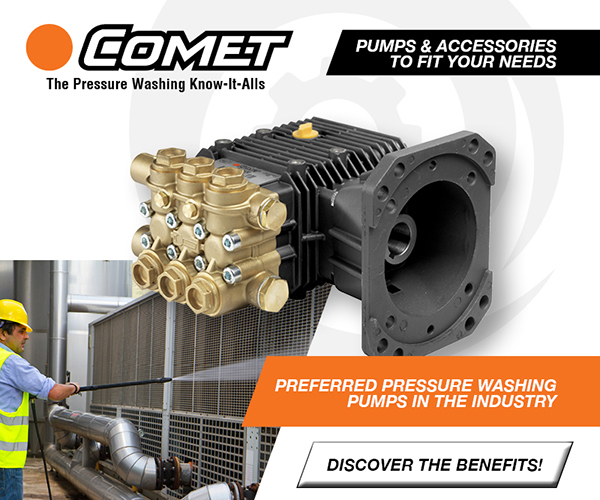
CETA Edge: Trust: A Two-Way Street in Manufacturer and Distributor Relationships
By Diane M. Calabrese / Published September 2014

Establishing Solid Relationships between Manufacturers and Distributors
Refreshing outlooks are always welcome. Take, for instance, the philosophy that building strong ties and good communication is everyone’s responsibility. In fact, it’s the philosophy that guides members of the Cleaning Equipment Trade Association (CETA).
“I would say that an essential element in the relationship between a manufacturer and distributor is the same thing that makes any relationship work,” says Aaron Auger, Water Treatment Division Manager at Mi-T-M Corporation in Peosta, IA. “That would be trust.”
Implicit in trust is reciprocity. “As a manufacturer, you have to trust that the distributor is giving you a fair share of their business and promoting your products where they can—and the distributor has to trust that the manufacturer is going to respect them and treat them fairly in the area that they represent,” explains Auger.
“Open and honest communication is also key,” says Auger. That ability to communicate allows problems that do arise to be resolved and “mutual respect” sustained. As a result, the business relationship will “thrive and grow.”
Indeed, it all revolves around trust, which is the essential element in a solid relationship between a manufacturer and distributor, says Terry Murray, Vice President of Sales at Etowah Chemical Sales & Service in Gadsden, AL. “There are several adjectives that I certainly could apply here—loyalty, dependability, and honor. As in any relationship, both distributor and manufacturer know how to accommodate each other.”
Accommodation demands understanding. “It is very important for a manufacturer to understand the problems a distributor faces on a daily basis,” says Murray. “A manufacturer that is willing to train and educate the distributor—and their personnel—is a big, key element in the relationship. The stronger the distributor, the stronger the manufacturer is.”
CETA membership is very important in building ties, explains Murray. CETA provides a setting where relationships can be forged. A genuine working relationship matters a great deal. “I believe the most essential element in a solid relationship between a manufacturer and a distributor is knowing the customer service rep or sales manager that represents the manufacturer,” says Judy Bowers, Vice President of Sales at R.J. Bowers Distributors, Inc. in Rockford, IL. “It may be a phone relationship or meeting the manufacturer reps through sales meetings or the CETA group.”
Person-to-person communication counts for a lot. “I have found that a really solid relationship comes from knowing someone to communicate a problem—or find an answer to—a question,” says Bowers. When the sales manager or sales representative from the manufacturer visits a distributor, the person-to-person link is built and strengthened, she explains.
The fundamentals are in play at every juncture. That means “believing and having trust in the manufacturer” is vital to the distributor in order to build a solid relationship, says Bowers.
“Trust” is the overarching factor, says Brenda Purswell, President of Alklean Industries in Pasadena, TX. “And always do what you say. Never abuse a manufacturer’s warranty. Attend manufacturers’ meeting where possible.”
Each decision a distributor makes can bolster the synergy with a manufacturer. Little things are important, too, as they all help to “build trust,” says Purswell. For example, be scrupulously candid. “If floor plans are offered, do not overstock or overstate your capabilities—and abuse the privilege.”
Walking in the Other’s Shoes
The more that a manufacturer understands the day-to-day life of a distributor and vice versa, the more quickly harmony is achieved. “Distributors face many challenges and many channels of competition,” says Purswell. “Having multiple lines will many times give the distributor an edge to combat that competition. Working with your manufacturers—finding a balance in your choice of equipment offered—is very important.”
It’s the responsibility of the distributor to make certain the manufacturer understands the challenges. Despite the good choices most manufacturers offer, there is sometimes a gap in a line of equipment. It’s a hole that a distributor must fill to reduce the chance a customer will leave without buying, explains Purswell. The gap could be price or options or ability to customize, she explains.
Quality products are musts. “From the distributor’s point of view, I expect a good, quality product that is ready for market when it emerges from the box with only tweaking adjustments,” says John Purswell, CEO at Alklean Industries. “With the days of UL 1776—soon to be 60335—we no longer have the latitude at the distributor level to make any major modifications to equipment without voiding the certification.”
“Applications expertise” is an essential service that the distributor performs for the manufacturer, says Purswell. It means the distributor does everything possible to match the equipment to the need of the end user and to ensure the equipment is used properly.
There are negative consequences when a manufacturer bypasses distributors, using other distribution channels. Such alternate routes damage the ties between manufacturer and the distributor, explains Purswell. And they put distributors at risk. Manufacturers should understand the significant role distributors have in servicing equipment and why the health of the manufacturer is tied to the health of distributors.
In many ways, building a relationship in business is little different from building one in private life. One should never be swayed by the sweet talk to the point of ignoring all else. “You want a manufacturer that will work with you when things are tight and equipment sales are slow,” says Purswell.
How does a distributor find the strongest manufacturers? “Join CETA,” says Purswell. “Talk to distributors from various manufacturers—ask questions of distributors that have nothing to gain or lose from answering truthfully and completely.”
And distributors must understand the perspective of a manufacturer. “Being fair, manufacturers want coverage from the area,” says Purswell. “A distributor must move enough product to justify your territory. Don’t take on more product lines than you can do justice, but protect your ability to survive things you have no control over.” The beyond-distributor-control issues include manufacturers that change ownership or management or distribution policies and philosophies, as well as slowdowns in production or an actual end to the manufacturer.
“The distributor’s place in the food chain is applications expertise, parts, service, rental, and detergent applications and distribution,” says Purswell. “Manufacturers cannot fill those roles as efficiently as distributors.”
Purswell points out that some manufacturers do choose to bypass distributors, having developed the strategy as part of their business model. Doing so, they reach more competitive parts of the market with some success.
“However, the manufacturers looking to penetrate the commercial and industrial markets have found that meaningful partnerships with serious distributors help them to penetrate the market, maintain their reputation of quality equipment when it is properly applied and installed, and supply service and warranty—as well as continued parts marketing after the sale.”
Purswell sums it up this way: “Trust is a two-way street. Both manufacturers and distributors should be protected. It is essential that both parties are able to believe— trust—that agreements will be kept to the best of each party’s ability.”
Allied, manufacturers and distributors make strong partners and a strong industry. The good interaction they have envelops customers in positive ways.
“People tend to buy from people that they like and trust,” says Auger. “That’s true in almost all aspects of sales—and if you have that solid relationship, you’ll have a good partner in sales.” Partners and allies never adversaries—that’s the goal.





